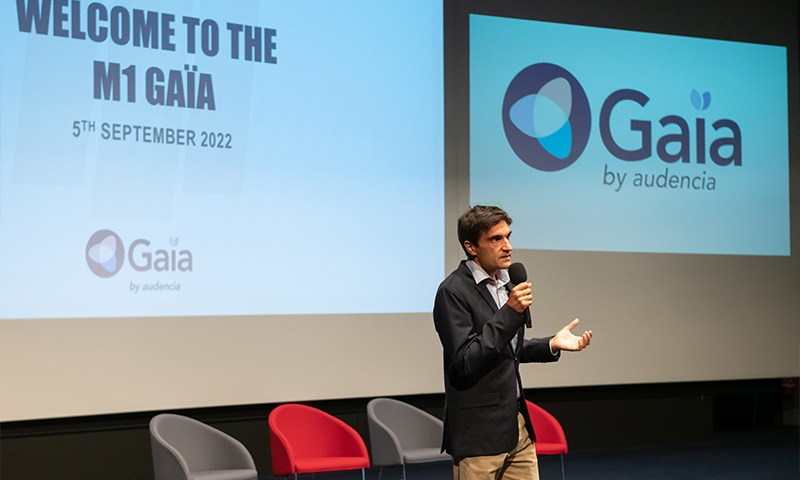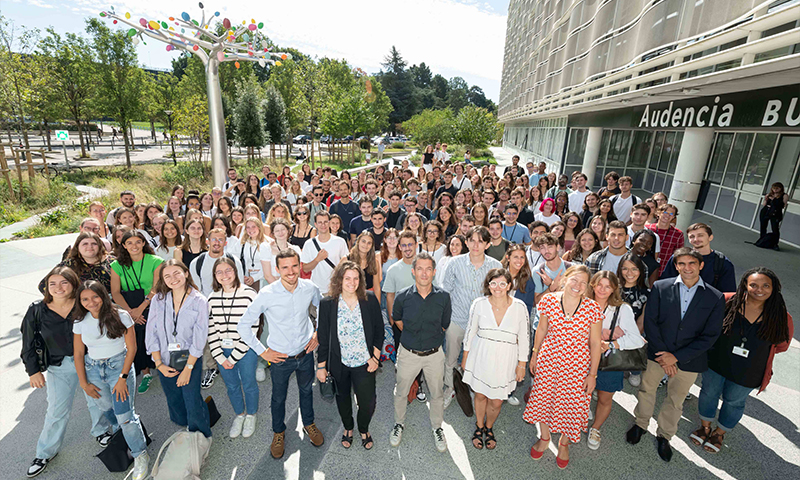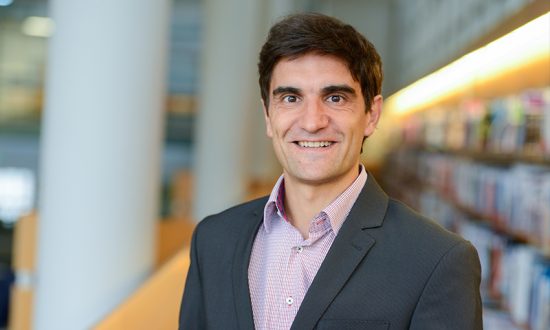José Maillet holds a Ph.D in management sciences. He is Professor of ecological and social transition at Audencia. Highly committed to Corporate Social Responsibility (CSR), he supports and advises companies and public organizations on strategic topics related to CSR and supports the deployment of CSR performance indicators, vectors of innovation and performance. In 2019, he developed a course in economics and energy transition integrated into the basic knowledge base of Audencia students. More than 1,000 students have to date received these essential lessons for a successful energy and ecological transition. In 2021, he took charge of Gaïa, the school for ecological and social transition launched by Audencia. In a conversation with Higher Education Digest, José Maillet talks about climate change, sustainability and how is Audencia responding to these challenges.
According to you, what strategies can be used to deal with global climate change?
Climate change poses a fundamental threat to the planet, species, and people’s livelihoods. The task is monumental, but as Greta Thunberg has said, no one is too small to make a difference and we all have our role to play. The most urgent actions required are to reduce our carbon footprint and to prepare for the consequences of global warming. Advocacy, mobilisation, activism, and action are of course key. Education has a huge role to play for change to happen, including those of us who are training future managers and CEOs. At Gaïa, we teach our students about the implications of climate change and the impact it has on the planet and the biosphere. These are huge challenges for companies. In response, in our ‘Climate Intelligence’ course, students learn about the work of the IPCC (Intergovernmental Panel on Climate Change), including Shared Socioeconomic Pathways (SSP) and climate forecasts for future decades up to 2100. They then work with companies to help design business models which respond to the IPCC scenarios. This work of anticipation and lucidity about a highly uncertain future deeply engages both the students and the companies, who begin to take into account a very different future from the one they had anticipated in their traditional business models.
Why Corporate Social Responsibility (CSR) matters in today’s society more than ever. How global organizations should contribute towards CSR activities.
We live in a complex world and face challenges which will define the future generations – and some may even say, the survival of our species. Climate change, social injustice, poverty, and war are all rife. Corporations have a strong influence on how our world changes and society progresses. While businesses are often portrayed as solely focussed on profit and as the cause of many of our current problems, they can also be a force for good, making a difference and enacting positive change. And that’s precisely what Corporate Social Responsibility (CSR) allows companies to do. CSR activities can take many forms: from reducing carbon footprint, participating in fair trade, ensuring better diversity, parity and inclusion in the organisation, to charitable giving or socially and environmentally conscious investing, among other things. CSR, activism and responsibility are all becoming non-negotiable for customers, shareholders as well as company professionals, especially the younger ones entering the job market, and companies who take all this seriously will be better able to retain talent. A lot of professionals are now looking for jobs with meaning and wanting to be part of a company which is engaged in positive change. They also want work-life balance and parity.

What is the purpose of teaching energy transition and climate change issues in business schools? How will it help shape the future?
The teaching of energy transition and climate change topics is of paramount importance in business schools. We are basically training the managers of the immediate future who will be shortly facing the above-mentioned global challenges whilst running a business and employing staff. These topics are not new at Audencia.
Audencia is a pioneering school in the field of Corporate Social Responsibility and has strong commitments in the field of sustainable development. It was the first French business school to sign the Global Compact in 2004. This UN initiative brings together companies around ten universal principles relating to human rights, labour standards and labour and environment law. In 2007, Audencia helped define the United Nations Principles for Responsible Management Education (PRME). This video explains the school’s strategy to meet the UN SDGs. And a few years ago, Audencia also became a “PRME champion”, a circle of the most engaged business schools in the world.
In 2019 Audencia launched its MSc Actor for the Energy Transition . This course, which is taught in both English and French, was developed in partnership with Centrale Nantes, ENSA Nantes and École de Design Nantes Atlantique, as well leading organisations such as the WWF. Its aim is to help students develop the skills needed to move into professions supporting energy transition and social justice. The teaching is organised around innovative and cross-disciplinary projects carried out with companies, NGOs and state bodies. After completing this course, a lot of alumni change career; for instance, we have people who used to work for leading global energy companies who now have moved into the renewable energy sector.
Can you please brief us about the mission and vision of Gaïa— the first such school launched by a business school (Audencia) dedicated to training in positive impact management strategies and practices, in line with the major challenges of ecological and social transition.
The devastating consequences of global warming, the collapse of biodiversity and the widening of inequalities (to name a few) call for accelerated and radical action. This is the role of Gaïa, the first School of ecological and social transition backed by a Business School.
The Gaïa programme, dedicated to the management of ecological and social transition, provides students with key skills needed to integrate societal and environmental issues into their future careers in finance, marketing, consulting, supply chain, and HR. Gaïa students learn to develop a culture of impact by combining knowledge from management, environmental sciences, humanities, and technology.
But Gaïa is not just a program for Audencia students. The school caters to a much wider audience. Audencia employees, companies and many of its stakeholders already benefit from Gaïa’s expertise. The specific aim of Gaïa is to allow those students most motivated by transition subjects to go faster and further, to experiment and ultimately to offer them a truly transformative experience. Audencia does not aim to train only managers of ecological and social transition. Other professions, with strong technical expertise, remain essential to the implementation of a successful ecological and social transition. To give you an example, Audencia trains highly technical financial experts, capable of integrating environmental and social issues into management tools. At Gaïa, we train ecological and social transition managers with a solid background in finance, making it possible to enact the necessary changes in this sector. Both expertises are complementary. This kind of synergy already exists in certain disciplines. For example, today’s biology research needs not only biologists, but also computer scientists with knowledge of biology to produce more relevant results. It is this kind of synergy between technical experts who understand Gaïa topics and managers of ecological and social transition that we seek to develop.
What are the current courses offered by the school? Is there a special entrepreneurial hub set-up at Gaïa’s campus? Please tell us about the programs initiated by this centre.
There are plenty of amazing courses offered at Gaïa. The Master 1 Gaïa semester programme, which is aligned with the United Nations Sustainable Development Goals and the Paris Agreement on Climate Change, is taught in English by permanent Audencia professors and professionals who are all leading experts in environmental and social issues and their management. The programme is composed of ten courses of 24 hours each. Courses include Human era and human organizations, Philosophy and Anthropology of Sustainable Business, Psychology and Sociology of Transition, Climate Intelligence, Diversity Management and Sustainable Compliance for Business, among others (full list below).

We have also developed four executive education modules for companies. These four modules are a gateway to understanding the need to transform an organization in order to adapt to the major changes to come. These executive programs have been a great success with managers and business leaders. For Audencia employees, we also offer ecological and social training throughout the year.
You teach the challenges of ecological and social transition, and more particularly the carbon assessment. What sparked your interest towards the subject?
The answer is simple: in the years to come, ecological and social transition will be everywhere, in every school, in every business, in every mindset. The stakes are so high that no human activity will be exempt from having to take into account global warming and sustainability. From a business perspective, engaging on this purpose well ahead of others obviously gives a competitive advantage. But we prefer to take the view that all stakeholders should embark as soon as possible on this path, creating a virtuous circle. That is the reason why Gaïa offers a lot of free content and opportunities to collaborate with external institutions. We want to create a network of different protagonists, from the private sector to NGOs and scientists.
Our world is based on competition, for everything from access to natural resources and energy access. While competition is a powerful tool to maximize results, we think that cooperation is an even more powerful tool, as it offers the ability to optimize. We need to optimize the use of natural resources, to think collectively about mobility, housing, infrastructure and of course food security. Focussing solely on competition and maximization often leads to short-term and unsustainable results. Think of fishing. Today, most fishermen work in competition, and as every year fish stocks are diminishing the competition becomes ever stronger. This is creating a disastrous downwards spiral: fishermen get ever poorer, the seas ever emptier of fish, and consumers suffer from higher prices and lower availability. On the Western coast of France in 2011, quotas were agreed in cooperation with scientists, so that fish stock were able to be preserved and regenerated. Fishermen realised that it was in their own self-interest to cooperate with each other and to respect the quotas. This led to spectacular results: after decades of depletion, today stocks of fishes are rising again at an impressive rate. This is what we call optimization versus maximization, collaboration versus competition. Herein lies our best interests.

In your current role, what type of challenges do you face? How do you tackle them?
There are many challenges. First, many people fear change. When you are a pioneer, you often create new pathways that hustle routine, that breaks the “business as usual” ideas. Second, we are very careful about greenwashing strategies. Being associated with Gaïa might be perceived as a good way for “dirty” businesses to “greenify” their image. Of course, every business, even considered as “dirty” is welcome to go “back to school” and to learn from our expertise. But by no means Gaïa is a vector for advertising a business activity. We handle these challenges by sticking to our roots: we are a school entirely dedicated to social and ecological transition topics. We keep it simple!
What are your current research interests? Please shed light on the topic.
We are gathering a team of academics and field-oriented researchers from different institutions and backgrounds. We collect data worldwide to answer the following question: What are the ingredients or conditions that would allow for a sea-change in attitudes that would lead to a virtuous circle? We have started by interviewing people who are recognized for their positive impact on society in many countries and in collaboration with different institutions. We expect to have the first results in 2023.
As the Head of Gaïa, what is your vision for the school for the next 5 years?
Within 5 years, ecological and social topics will be at the heart of all the leading business in the world, and we anticipate by then we will have ex-students becoming leaders in transitions.
I see Gaïa as very influential school – not because it is big, but because it is widely connected to other institutions, and well respected for its expertise. We will have programs dedicated to transition in every sector: industry, services, mobility, agriculture, urbanization and so on. There is a place for ecological and social transitions in every space of our modern societies. Let’s get on with it!




